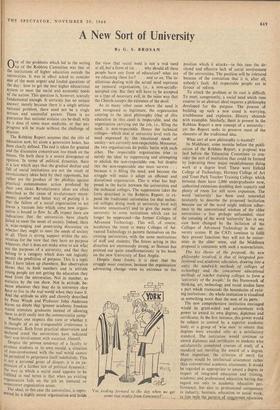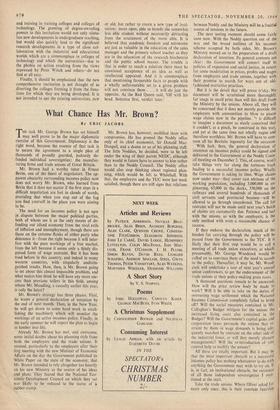A New Sort of University
By G. S. BROSAN
ONE of the problems which led to the setting up of the Robbins Committee was that of the institutions of higher education outside the universities. It was in effect asked to consider one of the most urgent and loaded questions of the day: how to get the best higher educational System to meet the social and economic needs of the nation. This question is, however, scarcely fundamental enough. It certainly has no unique answer; merely because there is a single serious national problem, there need not be a single serious and successful answer. There is no guarantee that national malaise can be dealt with by a dose of some mass medicine, or that any Progress will be made without the challenge of disaster.
The Robbins Report assumes that the role of education now, let alone a generation hence, has been clearly defined. The end is taken for granted and the discussion concentrates too much on the means. On both there is a severe divergence of Opinion. In terms of political dynamics, there is a law which says that the gradual decline and fall of social institutions are not the result of revolutionary ideas held by their opponents, but rather are the product of the phobias against Practical commonsense action produced by their own ideas. Revolutionary ideas are often described as the cause of revolutionary move- ments; another and better way of putting it is that the failure of a social organisation to act leaves a vacuum into which some new organi- sation is bound to flow. Jr. As respect there are Indications that the universities have clearly failed to meet the needs of society. Indeed, there Is wide-ranging and penetrating discussion on Whether they ought to meet the needs of society at all. There is strong support within the uni- versities for the view that they have no purpose Whatever, that it does not make sense to ask what are the purposes of a university, and that they belong to a category which does not logically Permit the prediction of purpose. This is a topic that I have taken up elsewhere. But observation shows that in both numbers and in attitude Young people are not getting the education they need from the universities. Not in number, as statistics by the ton show. Not in attitude, be- cause whatever they may do in university they have to live in the real world when they leave it. And the attitude so ably and cleverly described by Peter Winch and Professor John Anderson leaves no dciubt that 'greater academic freedom would stimulate graduates instead of allowing them to drift easily into the commercialist camp.'
Whether one respects this view or whether it Is thought of as an irresponsible irrelevance is Immaterial. Both from practical observation and declared creed the universities have indicated their non-involvement with vocation. Shantih.
Despite the proven tendency of a faculty to Produce students in its own mould, a situation of non-involvement with the real world cannot be permitted to perpetuate itself indefinitely. This is not a personal grunt of dissent; it is an ex- pression of a further law of political dynamics: the way in which a social need appears to be fulfilled in real terms is that when an existing organisation 'fails on the job an immoral or undercover organisation arises.
The ideal, in this case the universities, is repre- sented by a highly moral organisation and holds the view that social need is not a real need at all, but a form of sin . . . why should all these people have any form of education? what are we educating them for? . . . and so on. The in- stitutions dealing with the actual need represent an immoral organisation, i.e., a non-socially- accepted one. But they will have to be accepted as a type of necessary evil, in the same way that the Church accepts the existence of the devil.
As in many other cases where the need is not recognised as legitimate, the organisation catering to the ideal philosophy (that of elite education in this case) is respectable, and the organisation carrying out the job, i.e., filling the need, is non-respectable. Hence the technical colleges—Which deal at university level with the need expressed by the vocational needs of society—are currently non-respectable. Moreover, the two organisations do public battle with each other. The respectable organisation tries to satisfy the ideal by suppressing and attempting to abolish the non-respectable one, but despite this the non-respectable one must survive . . . because it is filling the need, and because the struggle will make it adopt an efficient and disciplined organisation. This is what has hap- pened in the battle between the universities and the technical colleges. The suppression takes the form described in the Robbins Report; to ex- pand the traditional universities (so that techni- cal colleges doing work at university level will become unnecessary) and to give the name of university to some institutions which can no longer be suppressed—the former Colleges of Advanced Technology. This will, of course, accelerate the trend in. many Colleges of Ad- vanced Technology to pattern themselves on the existing universities, with the same motivations of staff and students. The forces acting in this direction are enormously strong, as Sloman has pointed out quite unselfconsciously in his book on the new University of East Anglia.
Despite these forces, it is clear that the struggle must continue, because the organisation advocating change owes its existence to the 'I'm looking forward to the day when we get some real riv,alry.from Lancaster!' position which it attacks—in this case the de- clared and effective lack of social involvement of the universities. The position will be tolerated because of the conviction that it is, after all, nobody's fault. All respectable people are in favour of reform.
To attack the problem at its root is difficult. To meet, competently, a social need which runs counter to an abstract ideal requires a philosophy developed for the purpose. The process of building up such a new creed is worrying, troublesome and explosive. History abounds with examples. Similarly, there is present in the Robbins Report a new concept of a university: yet the Report seeks to preserve most of the elements of the traditional idea.
What sort of new philosophy is wanted?
In Middlesex, some months before the publi- cation of the Robbins Report, a proposal was laid before the Education Committee to con- Sider the sort of institution that could be formed by federating three major establishments doing work at a degree level. These were Enfield College of Technology, Hornsey College of Art and Trent Park Teacher Training College, which between them have 2,000 undergraduates now, authorised extensions doubling their capacity and plenty of room for still more expansion. The word 'university' has been used somewhat hesitantly to describe the proposed institution because use of the word might indicate adher- ence to the conventional wisdom of the older universities--a fear perhaps unfounded, since the meaning of the word 'university' has in any case been changed by the inclusion of the Colleges of Advanced Technology in the uni- versity system. If the CATs continue to fulfil their present functions they will not be univer- sities in the older sense, and the Middlesex proposal is consistent with such a nomenclature. The key theme of the proposal, the new philosophy involved, is that of integrated pro- fessional and academic education, drawing into a unity the sandwich methods of colleges of technology and the concurrent educational methods of teacher training colleges to form a 'university of the people.' In this framework of thinking, art, technology and social studies have a part which transcends the boundaries of exist- ing institutions: the whole institution is visualised as something more than the sum of its parts.
The new comprehensive institution envisaged would be grant-aided and autonomous with power to award its own degrees, diplomas and certificates. In the first instance, this power would be subject to control by a superior academic body or a group of 'wise men' to ensure that degrees were awarded only at a satisfactory standard. The institution would continue to award diplomas and certificates to students who satisfactorily completed courses of study of a standard not meriting the award of a degree.
Most important,. the criterion of merit for degrees would be intellectual attainment rather than conventional academic attainment. It would be regarded as appropriate to award a degree in respect of integrated education and training, academic and professional education having due
regard not only to academic education per- formance, but also to professional competence in industry, business, education or social work, in line with, thuattern„of sozurrenLeducation
and training in training colleges and colleges of technology. The granting of degree-awarding powers to this institution would not only stimu- late new developments in undergraduate teaching, but would also quickly lead to the significant research developments in a type of close col- laboration with the industrial and educational worlds which are a commonplace in colleges of technology and which the universities—due to the phobia on action resulting from the views expressed by Peter Winch and others—do not find at all easy.
Finally, it should be emphasised that the new comprehensive institution is not thought of as diverting the colleges forming it from the func- tions for which they are being developed. It is not intended to ape the existing universities, new or old, but rather to create a new type of insti- tution: more open, able to benefit the somewhat less able student without necessarily detracting from the attainment of the more able. It is believed that academic freedom and autonomy are just as valuable in the education of the sales manager and the primary school teacher as they are in the education of the research biochemist and the public school master. The trouble is that in order to reach a solution there must be emotional acceptance of an idea as well as intellectual appraisal. And it is commonplace that mentioning favourable facts to people with a wholly unfavourable set to a given problem will not convince them . . . it will do just the opposite. As the Red Queen said, 'Off with his head. Sentence first, verdict later.'



































 Previous page
Previous page